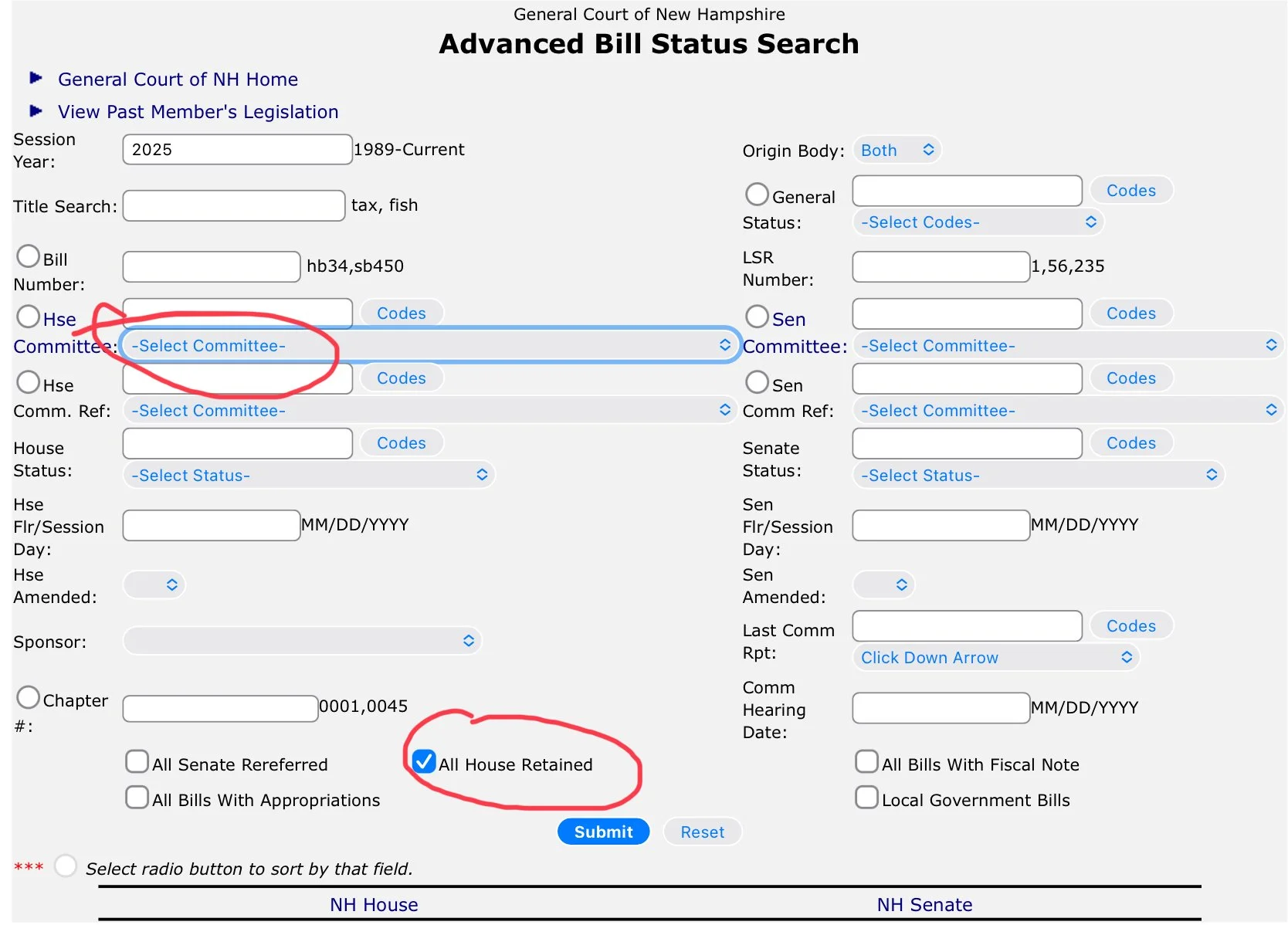Time to Give Thanks That Our Legislature Doesn’t Meet Year Round... Or Does It???
Remember all those bills that disappeared when legislative committees “retained” them last Spring? Probably not. But they’re baccccckkk! And before any new bills for 2026 can be voted on, the New Hampshire House must first deal with all 163 of them. Friday, November 21 was the deadline for committees to finalize and report these bills out for votes. So what sort of additional mayhem are we in for? Here’s a quick sampling…
Setting the Scene
Bills are typically retained by a vote of a legislative committee for a number of possible reasons.
The “benefit of a doubt” scenario: Sometimes members of the committee feel a bill needs more work and retaining it can add a few more months to work on it and build up consensus.
The “just in case” scenario: Other times bills are retained as a back-up in case an identical or nearly-identical bill making its way through the process in the other chamber is killed or tabled.
The “killing it softly” scenario: Sometimes bills are retained simply to avoid or delay making a decision on them, allowing them to be killed more quietly—or passed more quietly during a time when advocates and other stakeholders are less likely to be watching.
The “we have the votes so we can do anything we want” scenario: Bills can also be amended in ways that make them very different—and much worse—than the orginal bill at a time of year when only a fraction of the people who normally pay attention to Concord shenanigans are actually paying attention.
All retained bills, amended or not, receive a vote from the committee. The option are to recommend the bill to the full legislature as Ought to Pass (“let’s pass it”), Inexpedient to Legislate (“let’s kill it”) or sent to Interim Study (“let’s bore it to death before we kill it”). Retained bills for 2025 will be voted on by the full House during the first House session of 2025, which is scheduled for January 7th and 8th. Meanwhile, the Senate will vote on 74 leftover—or “re-referred”—bills of its own during its first session day.
Outcomes
Here’s what happened to several of the more controversial bills:
Recommended for Passage:
SB 134, a bill that mandates work requirements for Medicaid recipients that goes beyond the requirements of the budget bill passed earlier in the year by Congress, will move forward to the full House after an 11-6 vote the House Health, Human Services and Elderly Affairs Committee. While the federal bill requires clients to show proof of employment every six months, the New Hampshire version would require they show proof every three months. Rep. Kris Schultz, D-Concord, said the new mandate is demeaning for many of these clients who aren’t paid a livable wage. “This is upside down, immoral and backwards,” Schultz said. More.
A proposal that would allow the in-state sale of meat without the U.S. Department of Agriculture inspection required under federal law was approved 9-3 by members of the House Environment and Agriculture Committee. As amended, HB 396 would pit the state directly against the federal government. “I am a bit horrified by what you’re attempting to do here,” said New Hampshire Department of Agriculture, Markets, and Food Commissioner Shawn Jasper, expressing opposition to the bill during a Nov. 5 work session. More.
In another smack in the face to local control, Republicans on the House Finance Committee passed an amended version of HB 675. The bill imposes mandatory budget caps on school districts and would block school boards from bringing forward a budget that is bigger than the budget passed the year before, except for any increase in inflation. The bill comes at a time when state funding for public education continues to fail to keep pace with community needs, placing pressure on public school budgets, straining local taxpayers. But critics argue the mandatory cap would unfairly weaken voters’ input over their district’s spending and leave communities with no option to continue services community members feel are valuable. More.
A sweeping bill to allow the state to appoint administrators for financially troubled school districts was approved along party lines by the House Education Policy and Administration Committee. As amended, HB 121 would would deny school districts state funds if they fail to do audits and other financial reports, would allow the state Department of Education to place districts on probation for up to six months to correct deficiencies, and if they fail to do so, the department could hire an administrator to oversee the district with sweeping authority to override school board decisions, make changes to day-to-day operations, cancel or renegotiate contracts and lay off or fire personnel. More.
HB 155, a proposal to cut the business enterprise tax from 0.55% to 0.5%, cleared the House Ways and Means Committee along party lines. The move comes at a time when state revenues are down and evidence is becoming clear that a decade of business tax cuts have resulted in revenue losses of over $1 billion ,which have NOT been offset by corresponding business and revenue growth, as Republicans in Concord like to claim. More.
HB 194 , legislation that would criminalize over-protective behavior from a parent in a child custody battle, was approved by a party line vote of the House Criminal Justice and Public Safety Committee. Under current New Hampshire law, a parent can be charged with a misdemeanor if they take a child out of the state in order to deny access to another parent or to a child protective agency like the Division for Children, Youth, and Families. There is also a misdemeanor penalty for taking, enticing away, detaining, or concealing a child. But there are no criminal penalties for violating a custody arrangement if the child remains in the state. More.
Performative politics are squarely behind the 9-6 party line approval of SB 15 . As amended, the bill would require people convicted of murder or the sexual assault of a child under 13 to be sentenced to “hard labor”. “Retribution not rehabilitation” is apparently our new state motto. While no one has much sympathy for offenders who have committed crimes like these, there is no evidence that this unneeded policy that no one in the Department of Corrections has asked for will do anything to deter people from committing these crimes in the future—and funding it will take money away from rehabilitation programs—increasing recidivism when it comes to other inmates. As a practical matter, inmates at the state prison are already required to work. Let’s also not forget that they are already in an aging prison that makes Shawshank look like a Sandals Resort. What’s more, coming up with jobs that meet the requirements of the bill for a very small number of inmates poses all sorts of questions not only when it comes to the cost—but also when it comes to the security and safety of staff, other inmates, and members of the public—especially if any of these “hard labor” jobs are outside prison walls. And then there’s the cost of funding an unneeded program that poses real risk and sucks valuable resources and staff time away from prison programs that actually are working—and at a time when the same legislators voted earlier to cut $10 million from the Department of Corrections budget. More.
As part of the ongoing effort of House Republicans to make voting impossible for some and a hassle for everyone else, HB 323 passed the House Election Law Committee by a 10-7 vote. It eliminates student IDs as a valid source of identification to obtain a ballot at a polling place. Also worth noting is an amended version of HB 365 cleared the House Finance Committee 16-9. The bill would establish a process that, in theory, might allow an indigent voter lacking documentation, such as a passport, to prove his or her citizenship so he or she can get a ballot. (For the uninitiated, proof of both citizenship and residency are now required to register to vote in New Hampshire.) So how would the process work in practice if someone comes to the polls to vote and claims they don’t have the necessary documentation because they can’t afford to pay for it? Welp, the bill directs supervisors of the checklist to contact the Secretary of State’s office (unless they’re too busy), which then has the option (if they’re not too busy) of searching applicable state and federal databases that may—or may not—list the person’s citizenship status. The other option? By now you may have guessed that local election officials and the Secretary of State’s office can simply claim they’re too busy—you know, with election stuff. Here is language directly from the bill itself: “If the request to verify citizenship status is made on election day, neither local election officials nor the secretary of state shall be required to expend such time or effort on citizenship verification as would unreasonably interfere with their other election day duties.”
A bill that calls for eliminating all diversity, equity and inclusion activities throughout state government narrowly cleared the House Human Services and Elderly Affairs Committee by a 9-8 party line vote over the claims of critics that it could jeopardize up to $100 million in federal aid. During a two-hour public hearing last spring, advocates and clients in these programs turned out to oppose HB 392 while the bill’s sponsor, Rep. Mike Belcher, R-Wakefield, was the only one to speak in support. More.
What About Funding for More Housing?
The House Finance Committee recommended that the full House kill HB 572 by a 14-11 vote. The bill would establish a “partners in housing” program to provide low interest loans and grants to help cities and towns build housing on municipally-owned land suitable for residential development. The idea? Housing costs money and unless we want all housing in the state to cater to the top of the market, the state has to assume a role in helping communities seed the development of workforce housing, single-family starter homes, duplexes, small apartment buildings, and other “missing middle” housing. As originally introduced, the bill would have provided $10 million in state funds to the housing champions program, but a minority amendment that will be introduced during the January floor debate would cut that amount to $5 million. If the bill is killed, no money would be appropriated.
What About the Other Retained Bills?
To see results for other retained bills:
Go to the General Court Website: https://gc.nh.gov
In the “Current Bills” box on the Home page: Select “Advanced Bill Search”
On the Advanced Bill Status Search page:
To see ALL retained bills, select “All House Retained” near the bottom of the page and select “Submit”
To see bills acted on by a particular committee, select the name of the Committee from the “Houise Committee Dropdown menu, select “All House Retained”, and Submit.


